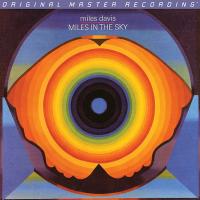Mo-Fi's Miles in The Sky With Diamonds!
This rock-jazz fusion built upon well-structured jams represented a bridge to the giant step that would be the daring In a Silent Way. Herbie Hancock's electric Fender Rhodes piano—a first on a Miles album— points the way to what was to come on the opener "Stuff", which blends soul, jazz and rock anchored by Ron Carter's electric bass.
The long running quintet of Davis, Hancock, drummer Tony Williams, bassist Ron Carter and tenor saxist Wayne Shorter broke up soon after this album's release in July of 1968 as Davis moved towards rock, funk and straight forward time signatures. Filles de Kilimanjaro was the quintet's final release, recorded in June and September of 1968 and released in early 1969.
On Wayne Shorter's "Paraphernalia" sequenced second but recorded first in January of 1968, Hancock is on acoustic piano, which helps give the track a more conventional sound as does the recording, which has more mike leakage and less of "Stuff's" spare, compartmentalized sound. George Benson sits in.
Tony Williams' "Black Comedy" shifts time throughout and can make you seasick if you're not paying attention to the goings on. Davis's improvs over the shifting sands are sensational, but more amazing is Williams' playing, which rumbles, sifts and shimmers in unusual percussive shape-shifting.
The set ends with Davis's segmented "Country Son", which also shifts time signatures going from straight forward to rhythmic snaking and back. The mid section threatens to fall apart before it again hits its stride shifting back to straight time. Here the engineers apply plenty of echo to Shorter's sax and behind William's drum kit. There's nothing coherent about this album's sonics!
A comparison between the original Columbia "2-eye" and the Mobile Fidelity double 45 is a mixed bag depending upon what you like. The original is brighter and more in your face—which was a sonic characteristic of this era of Miles's Columbia output. The reissue is somewhat warmer but not exactly mellow (which is a good thing).
While listening to the original I kept thinking what a shame Williams' drum kit was sounding so thin and too far back in the mix. The 45rpm reissue moves Williams forward and puts him more in the mix partly by warming up the upper mids to give the cymbals more "meat" but you do lose a bit of the hard-edged cymbals. Hancock's piano sounds far more "woody" and less "metallic" than it does on the original.
I think this double 45 is far preferable to the original—especially on bottom (compare Carter's bass on the opener, which way favors the reissue) but opinions may differ. The reissue is definitely more listenable.
Overall, I think Mobile Fidelity's Miles Davis reissue series is among the company's most consistently successful. To me, this record now sounds as I think the producers and artists intended.



